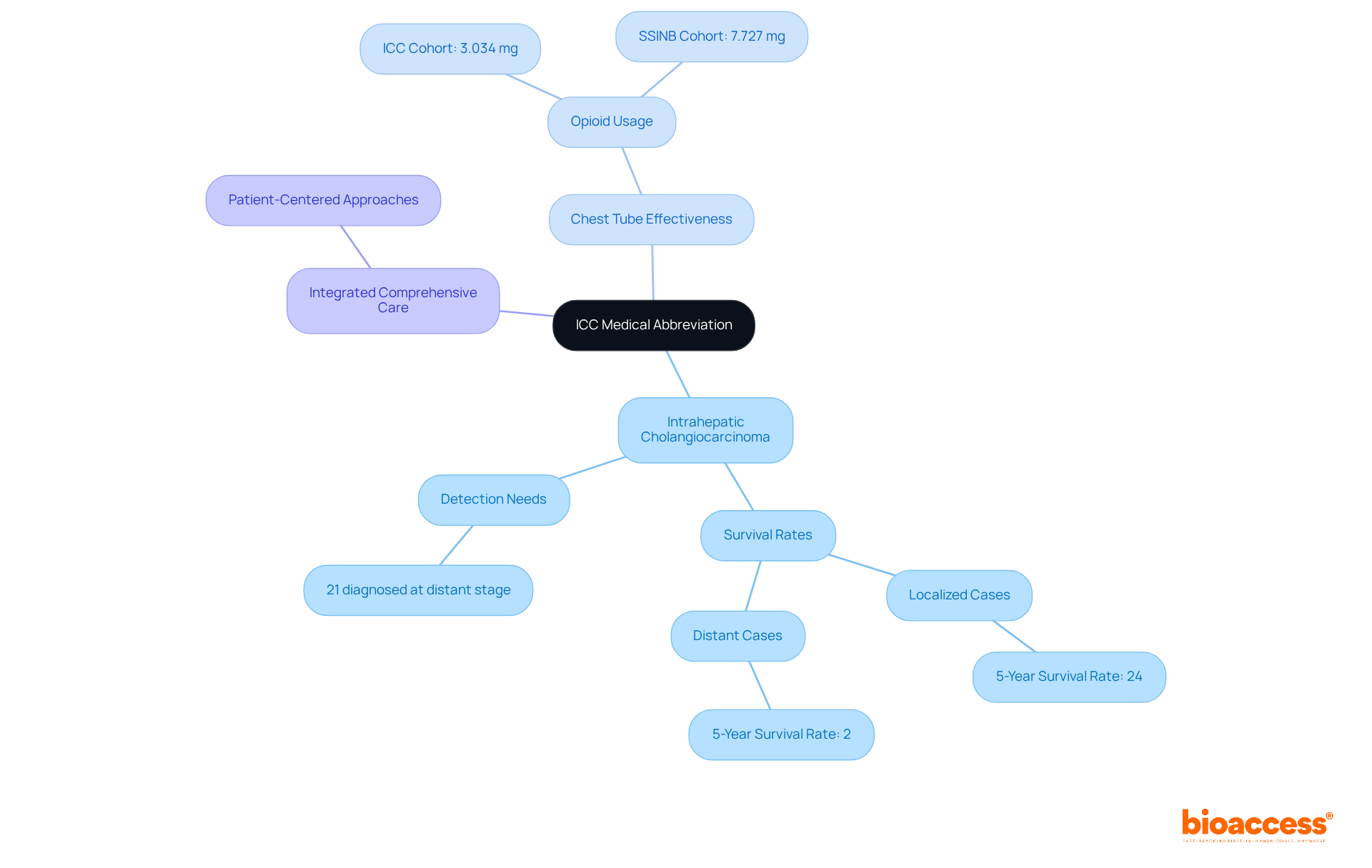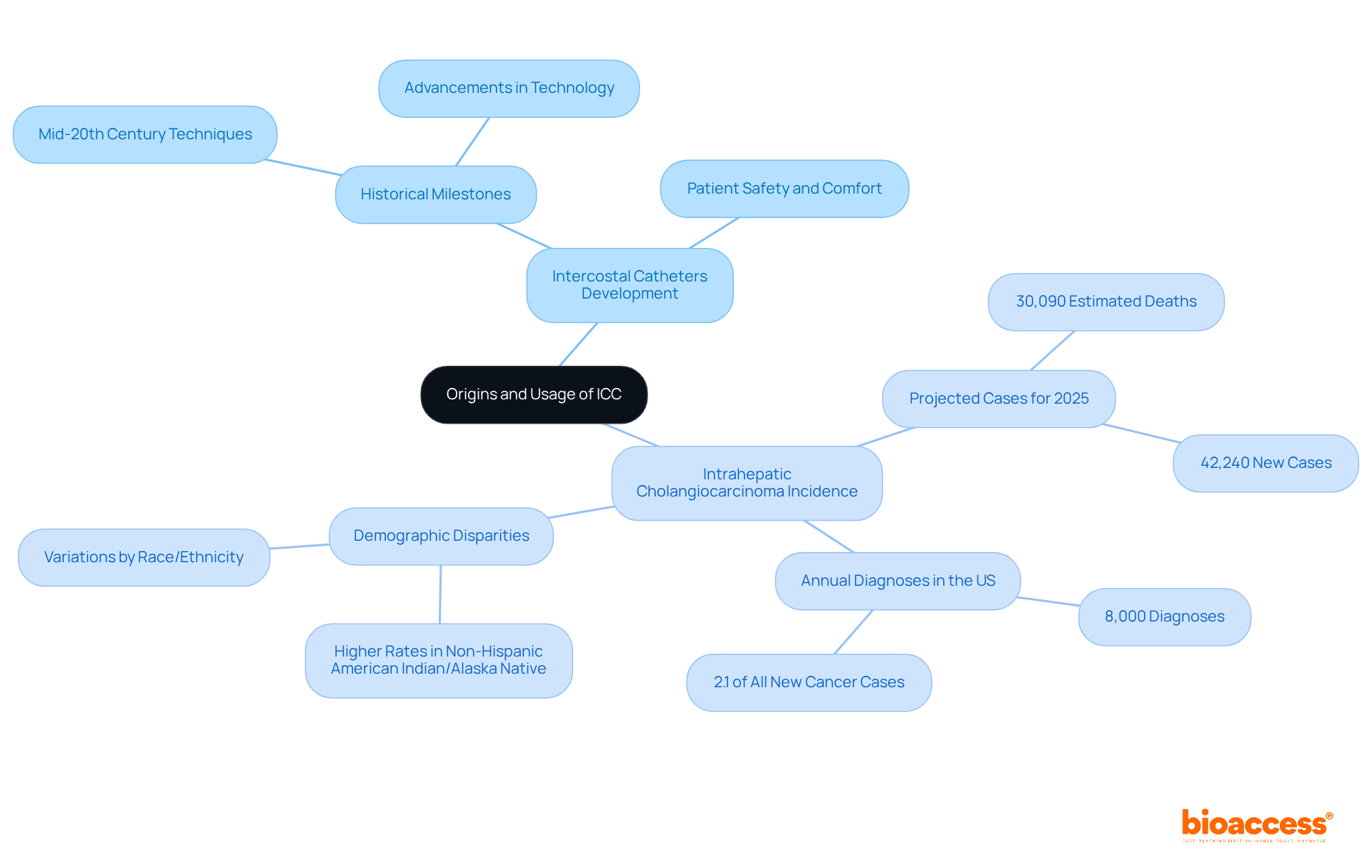


The ICC medical abbreviation primarily denotes Intrahepatic Cholangiocarcinoma, a serious liver cancer that is projected to see an increase in incidence. Additionally, it refers to the Intercostal Catheter, a medical tool utilized for fluid drainage that significantly enhances postoperative outcomes. Understanding these terms is crucial within the healthcare landscape, as effective diagnosis and treatment hinge on this knowledge. The stark survival rates associated with ICC underscore the urgency of awareness, while the improved pain management linked to intercostal catheters highlights their vital role in patient care.
The ICC medical abbreviation encompasses critical terms in healthcare, notably Intrahepatic Cholangiocarcinoma and Intercostal Catheter, both of which are integral to patient diagnosis and treatment. Understanding these definitions is essential, as they not only influence clinical decisions but also underscore the urgent need for early intervention in aggressive conditions like ICC.
How do these seemingly disparate terms converge to shape effective medical practices? What implications do they hold for patient outcomes?
The icc medical abbreviation encompasses several critical healthcare terms, notably Intrahepatic Cholangiocarcinoma and Intercostal Catheter.
Intrahepatic Cholangiocarcinoma (ICC) is a malignancy that originates in the bile ducts within the liver, with a concerning projected increase in incidence of up to 99% in the U.S. by 2029. This cancer primarily affects older adults, with the average age of diagnosis in the 70s, presenting a formidable prognosis; the overall 5-year survival rate is a mere 9%. Alarmingly, a total of 113,450 ICC-related deaths were recorded between 1999 and 2020, underscoring the profound impact of this disease.
Conversely, the Intercostal Catheter (ICC) is a vital medical tool utilized to evacuate fluid or air from the pleural space in the thoracic cavity, significantly improving postoperative outcomes. Research indicates that individuals using intercostal catheters experience markedly lower opioid consumption, averaging 4.48 mg compared to 7.23 mg in the No ICC group (p = 0.023), alongside reduced rates of chronic post-surgery discomfort, with only 1.5% reporting pain one year after surgery versus 10.8% in the No ICC group (p = 0.035).
Additionally, the ICC medical abbreviation denotes a holistic model that amalgamates various health services, thereby enhancing client support and care coordination. Understanding these definitions is paramount for healthcare professionals, as they directly influence diagnosis, treatment strategies, and the overall management of individuals.

The icc medical abbreviation is of substantial importance in medical terminology, encompassing several critical concepts that significantly impact care for individuals. Intrahepatic Cholangiocarcinoma, a rare yet aggressive form of cancer, necessitates prompt diagnosis and treatment, as survival rates vary dramatically based on the stage at which the disease is identified. For localized cases, the five-year relative survival rate is approximately 24%, but this drops to just 2% for distant cases, underscoring the urgency of early intervention. Notably, 21% of liver and intrahepatic bile duct cancer cases are diagnosed at the distant stage, emphasizing the critical need for early detection and treatment strategies. The overall five-year relative survival rate for intrahepatic bile duct cancer is only 8%, further highlighting the importance of timely intervention.
In emergency medicine, the chest tube plays a crucial role in managing conditions such as pleural effusions and pneumothorax. Research has demonstrated that individuals receiving a catheter between the ribs experience significantly lower opioid usage for pain management compared to those treated with alternative methods, indicating enhanced outcomes for those involved. Specifically, one study revealed that the cohort defined by the ICC medical abbreviation required only 3.034 mg of morphine equivalents, compared to 7.727 mg in the alternative treatment group, highlighting its effectiveness in postoperative pain management.
Additionally, the ICC medical abbreviation stands for Integrated Comprehensive Care, which represents a paradigm shift towards patient-centered approaches, ensuring that individuals receive coordinated and continuous care across various health services. This comprehensive viewpoint is crucial for healthcare providers striving to provide effective and timely interventions, ultimately improving outcomes across various medical situations.

The origins of Intercostal Catheters (ICCs) can be traced back to the mid-20th century, when initial techniques were rudimentary and focused primarily on basic drainage needs. Over the decades, the technology has significantly advanced, leading to the development of sophisticated devices designed to enhance patient safety and comfort. This evolution reflects a broader trend in healthcare, where the integration of innovative technologies has improved procedural outcomes, underscoring the importance of the ICC medical abbreviation in modern medical practice.
Intrahepatic Cholangiocarcinoma (ICC), recognized as a distinct entity in oncology, has seen a notable increase in incidence rates, with an estimated 42,240 new cases projected for 2025. This rising incidence has prompted extensive research into its etiology and treatment options. The increasing recognition of the ICC medical abbreviation's complexities has resulted in improved methods for its management, including the use of chest catheters for effective drainage and symptom relief, which are crucial for enhancing patient quality of life.
Furthermore, the American Cancer Society notes that bile duct cancer is rare, with about 8,000 diagnoses annually in the United States. This statistic underscores the significance of the ICC medical abbreviation in the treatment of a condition that is often difficult to diagnose. This historical viewpoint emphasizes the essential function of the ICC medical abbreviation in influencing modern medical practices, ultimately leading to enhanced outcomes for individuals and an overall improvement in the quality of care.

The features of the icc medical abbreviation vary significantly based on their intended application. For example, Intrahepatic Cholangiocarcinoma (iCCA) is recognized for its aggressive progression, often diagnosed at advanced stages. This reality emphasizes the necessity for sophisticated diagnostic methods and treatment protocols. Notably, statistics reveal that 89% of patients with iCCA are diagnosed at advanced stages, with a median survival of just 286 days for those affected.
Intercostal Catheters, on the other hand, are designed for straightforward insertion and efficient drainage, with specific designs tailored for various clinical scenarios, including trauma management and chronic pulmonary conditions. Furthermore, chronic pancreatitis presents a significant risk factor, correlating with a threefold increase in the likelihood of developing iCCA.
A comprehensive understanding of these variations and applications, bolstered by relevant statistics and case studies, is crucial for healthcare professionals aiming to effectively implement the ICC medical abbreviation in their practice.

The ICC medical abbreviation embodies vital concepts in the healthcare field, representing terms such as Intrahepatic Cholangiocarcinoma and Intercostal Catheter. Understanding these definitions is essential for healthcare professionals, as they directly impact diagnosis, treatment, and patient care coordination. The significance of ICC transcends mere terminology; it encapsulates the urgency of addressing serious medical conditions like ICC and the importance of effective tools like intercostal catheters that can enhance patient outcomes.
Throughout the article, the critical aspects of both Intrahepatic Cholangiocarcinoma and Intercostal Catheters are explored. The alarming statistics surrounding ICC highlight the need for early detection and intervention in cancer care, while the benefits of intercostal catheters in managing postoperative pain underscore their role in improving patient recovery. Additionally, the holistic approach of Integrated Comprehensive Care emphasizes the importance of coordinated health services, which is essential for delivering effective patient-centered care.
Ultimately, recognizing the multifaceted nature of the ICC abbreviation is crucial for advancing medical practices and improving patient outcomes. Healthcare professionals are encouraged to deepen their understanding of these terms and their implications, ensuring that they are equipped to provide timely and effective care. By prioritizing education on the ICC medical abbreviation, the healthcare community can enhance its response to complex medical challenges, ultimately fostering better health for patients.
What does the medical abbreviation ICC stand for?
The ICC medical abbreviation stands for several critical healthcare terms, notably Intrahepatic Cholangiocarcinoma and Intercostal Catheter.
What is Intrahepatic Cholangiocarcinoma (ICC)?
Intrahepatic Cholangiocarcinoma is a malignancy that originates in the bile ducts within the liver. It primarily affects older adults, with an average diagnosis age in the 70s, and has a concerning 5-year survival rate of only 9%.
What are the projected trends for Intrahepatic Cholangiocarcinoma in the U.S.?
The incidence of Intrahepatic Cholangiocarcinoma is projected to increase by up to 99% in the U.S. by 2029.
How many ICC-related deaths were recorded between 1999 and 2020?
A total of 113,450 ICC-related deaths were recorded in the U.S. between 1999 and 2020.
What is an Intercostal Catheter (ICC)?
An Intercostal Catheter is a vital medical tool used to evacuate fluid or air from the pleural space in the thoracic cavity, significantly improving postoperative outcomes.
How does the use of Intercostal Catheters affect opioid consumption after surgery?
Research shows that individuals using Intercostal Catheters consume significantly lower amounts of opioids, averaging 4.48 mg compared to 7.23 mg in those not using the catheter.
What impact does the Intercostal Catheter have on post-surgery pain?
The use of Intercostal Catheters is associated with reduced rates of chronic post-surgery discomfort, with only 1.5% of patients reporting pain one year after surgery compared to 10.8% in the group without the catheter.
What is the holistic model denoted by the ICC medical abbreviation?
The ICC medical abbreviation also denotes a holistic model that integrates various health services to enhance client support and care coordination.
Why is understanding the ICC definitions important for healthcare professionals?
Understanding these definitions is crucial for healthcare professionals as they directly influence diagnosis, treatment strategies, and the overall management of patients.